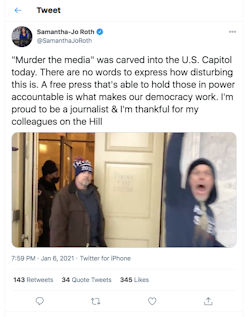SEJournal Online is the digital news magazine of the Society of Environmental Journalists. Learn more about SEJournal Online, including submission, subscription and advertising information.
 |
 |
| The U.S. government’s espionage case against Julian Assange raises core issues of press freedom. Above, a poster at a pro-Assange rally in Barcelona, February 2020. Photo: Assemblea Nacional Catalana, Flickr Creative Commons. Click to enlarge. |
WatchDog Opinion: Assange Case Raises Free Press Concerns; Pushback on ‘Murder the Media’ Message
By Joseph A. Davis
1. Assange ‘Espionage’ Charges Could Weaken Press Freedoms
2. ‘Murder the Media’ Message Highlights Escalating Attacks
1. Assange ‘Espionage’ Charges Could Weaken Press Freedoms
Julian Assange may be despicable, apparently taking from the Russian intelligence agencies emails it had stolen from Democratic National Committee servers and then released them in ways that helped the Trump campaign in 2016.
But the U.S. government’s case against him raises core issues of press freedom that impact many journalists, even as Assange’s own claims to being a legitimate journalist are lame. We need to hold our noses and urge the incoming Biden administration to drop or modify the federal case.
Before the 2016 release, Assange had received and published classified information from Chelsea Manning in interactions beginning in 2010. The information had to do with the Iraq war, not the 2016 election. But after initial hacking charges, Assange was charged by the Justice Department in 2019 under the Espionage Act.
The Espionage Act had never been used against
a journalist. If the Assange prosecution succeeds,
it could restrict press freedom for many journalists.
The Espionage Act had never been used against a journalist. That is what raises the problem. If the Assange prosecution succeeds, it could restrict press freedom for many journalists.
The legislative history leading up to the Espionage Act of 1917 — and the history of amendments to it in later years — are too long and complex to discuss here.
But the plain language of the law suggests that it was meant to apply only to government employees who hold government secrets, making it illegal to give those secrets to people outside government who are not authorized to have them.
The Obama administration escalated the use of the Espionage Act against leakers; then the Trump administration further escalated, using it against non-government people who publish the leaks. Namely Assange.
Assange, whatever else he may claim to be, is not a federal employee (he is not even a U.S. citizen). He may claim (and may once have had a credible claim) to be a journalist. His collaboration with Russia and his animus toward Democrat Hillary Clinton undermine such claims.
But one problem is that any attempt by the government to define who is or isn’t a journalist opens a Pandora’s box. The biggest problem, however, is that if the United States can use the Espionage Act against Assange for his disclosures, then the way is made clear to use it against any journalist (may require subscription) who discloses classified information.
That would make writing about the Pentagon Papers, or publishing them, illegal.
Leaks are key to much great journalism
Not everything that is classified should be. The government has often used secrecy to hide misdeeds and crimes. The job of journalists is to let the public know about the things the government is doing wrong.
Leaks from whistleblowers and other government officials — some with security clearances — have been the core of a lot of great journalism in the public interest. But newspaper publishers actually do talk to lawyers before rolling the presses on these momentous stories. (Did you see The Post?)
‘News is what people want to keep
hidden, everything else is publicity.’
— Attributed by Bill Moyers
to an unnamed mentor
“News is what people want to keep hidden, everything else is publicity.” We first heard that maxim from Bill Moyers, who attributed it to an unnamed mentor.
Trump’s Espionage Act charges against Assange were not unsealed (and revealed to the public) until May 2019 (may require subscription). The U.S. government had been seeking to extradite Assange to stand trial on these charges, but in Jan. 2021, a judge in the United Kingdom, where he is being held, denied extradition (may require subscription).
The U.K. court system has still not freed Assange. And, while the Trump administration might want to appeal, the Biden team will soon take over the Justice Department. The whole thing remains unresolved.
The Biden administration could settle it by dropping the Espionage Act charges, even if it kept other charges. That would extinguish the worst threat to press freedom — if not all remaining controversy. The Biden DOJ could also decline to appeal the U.K. denial of extradition. Biden has given no hints of what his DOJ might do. Yet.
Meanwhile, a wide international array of journalists and free press groups have issued statements opposing further prosecution of Assange.
Yet another resolution could come from Congress. A Senate bill introduced by Ron Wyden (D-Ore.) in the last Congress would have exempted most journalists from the Espionage Act. A similar bill was introduced in the House by Ro Khanna (D-Calif.). Neither bill got action.
2. ‘Murder the Media’ Message Highlights Escalating Attacks
Remember the First Amendment? Among the creepiest images coming out of the Jan. 6 pro-Trump mob assault on the Capitol building was a shot of the words “murder the media” scrawled on a door.
 |
|
A journalist captured the “Murder the Media” message on her Twitter feed. Image: @SamanthaJoRoth. Click to enlarge. |
There was a lot more. Including video of the mob manhandling a journalist and smashing thousands of dollars worth of video equipment (posted on Twitter by Bloomberg reporter William Turton). The Reporters Committee for Freedom of the Press was among the first to protest.
It’s a good moment to recall that there isn’t actually a federal law against assaulting, threatening or murdering news media personnel performing their duties.
And it’s a good year to recall that there is, in practice, impunity for assaults against journalists performed by police themselves. The street demonstrations following the murder of George Floyd last summer saw lots of examples. And there’s coverage of police violence against journalists (may require subscription).
Many in the media felt that there had been a steady escalation of such attacks during the drumbeat of Trump’s attacks on the media as “the enemy of the people.” Journalism organizations (including the Society of Environmental Journalists) protested strongly on many occasions.
But after all that, not much changed.
One helpful suggestion came from Rep. Eric Swalwell (D-Calif.). During the last Congress, Swalwell introduced a bill (HR 1684) called the Journalist Protection Act, making it a crime to assault journalists. Congress took no action on it. Perhaps the next Congress should.
Joseph A. Davis is a freelance writer/editor in Washington, D.C. who has been writing about the environment since 1976. He writes SEJournal Online's TipSheet, Reporter's Toolbox and Issue Backgrounder, as well as compiling SEJ's weekday news headlines service EJToday. Davis also directs SEJ's Freedom of Information Project and writes the WatchDog opinion column and WatchDog Alert.
* From the weekly news magazine SEJournal Online, Vol. 6, No. 2. Content from each new issue of SEJournal Online is available to the public via the SEJournal Online main page. Subscribe to the e-newsletter here. And see past issues of the SEJournal archived here.










 Advertisement
Advertisement 


